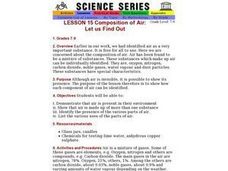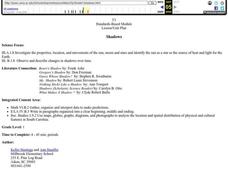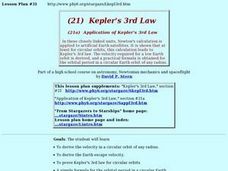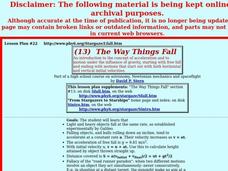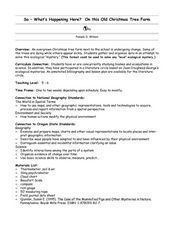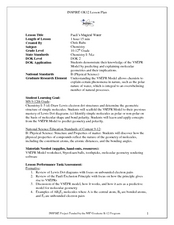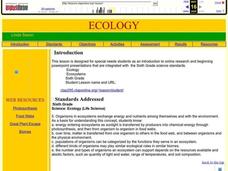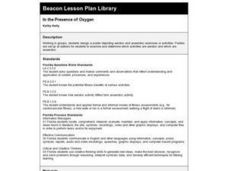Curated OER
Composition of Air: Let us Find Out
Students identify the various components of air as they demonstrate that air is present in the environment.
Curated OER
Shadows
First graders measure how a shadow changes over the course of a day. They write about what they would do if they lost their shadow, and make silhouettes of themselves. Students make up a shadow dance and read stories about shadows.
Curated OER
Kepler's 3rd Law
Students derive the velocity in a circular orbit of any radius. They derive the Earth escape velocity and prove Kepler's 3rd law for circular orbits # A simple formula for the orbital period in a circular Earth orbit of given radius.
Curated OER
The Resistor Color Code and Reading a Multi-meter.
Students explore how to read the resistor color code and a meter.
Curated OER
The Way Things Fall
Students explore concept of acceleration and motion under the influence of gravity, starting with free fall and ending with motions that start out with both horizontal and vertical initial velocities.
Curated OER
The High Plains: Land of Extremes
Learners complete activities surrounding the study of groundwater movement, energy resources, wind energy, and riparian areas. They debate/role-play the viewpoints of different interest groups in considering whether the black-footed...
Curated OER
How do plant & animal cells make and use energy?
Students show the relationship between the need for plants to undergo photosynthesis in order to generate oxygen. They see the flaws associated with this thinking because of the lack of CO2 and H2O and lack of sufficient gravity in order...
Curated OER
Growing a Winter Garden
Second graders listen to planting story, identify vegetables in pictures, and watch teacher demonstrate proper way to plant seeds in soil, and water. Students then plant seeds into their own containers.
Curated OER
Classifying Matter Game
Students identify the different states of matter. In this chemistry lesson, students differentiate the physical properties of the three states. They apply what they learned by playing a team game at the end of the lesson.
Curated OER
An Introduction to Thermal Spray Technology
Students discuss difference between kinetic and thermal energy, develop and demonstrate understanding of key concepts and characteristics underlying thermal spray techniques, list items used in their daily lives that are coated, examine...
Curated OER
Chemical Bonding
Eighth graders identify the three main types of chemical bonds. In this chemistry lesson, 8th graders draw Lewis dot diagrams of elements and determine the bond formed. They create a model water molecule.
Curated OER
Facts of Matter
Students make group decisions about matter as they explore and interpret many types.
Curated OER
Don’t be a Stoic about Stoichiometry
Students review balancing chemical equations. In this chemistry instructional activity, students calculate moles of an unknown substance based on stoichiometric relationships in the balanced equation. They cite applications of...
Curated OER
So -- What's Happening Here? On this Old Christmas Tree Farm
Students take a field trip to an old Christmas tree farm near their school. In groups, they gather data at the site and analyze the data in an attempt to discover what happened to the area. They identify human activities that led to the...
Curated OER
Pauli's Magical Water
Pupils predict the shape of molecules using VSEPR theory. In this chemistry lesson, students differentiate a polar and nonpolar molecule. They discuss why water's polarity is very important.
Curated OER
A Solution for Moles
Students calculate the concentration of different solutions. In this chemistry lesson, students explain what a solution is. They explain ways to change the concentration of a solution.
Curated OER
GIS and Agriculture
Students are introduced GIS systems and how they operate. Using a GIS system, they locate and map the various types of agricultural products grown in Oregon. They rank each county based on the amount of agricultural products produced and...
Curated OER
Brine Shrimp 1: Hatching Brine Shrimp
Young scholars review their prior knowledge on brine shrimp. In groups, they raise a group of brine shrimp and design an artificial environment in which they can live. They change the conditions of the environment to see how the shrimp...
Curated OER
Snacks 'R Us
First graders experiment with fat content by analyzing snack foods. They learn what makes up a nutritious snack.
Curated OER
Energy and Fuels
Students compare and contrast the various energy resources available to the general population. Working in groups, they research the energy source of their choice and create a presentation detail their research and comparing their...
Curated OER
Ecology
Sixth graders are introduced to online research and beginning PowerPoint presentations that are integrated. They pass a plant and photosynthesis. Students locate information on a self selected animal online. They give a PowerPoint...
Curated OER
Stream Flow in Blacks Creek
Students explore what factors affect the stream flow in a local body of water. They collect data to measure stream flow and discharge and construct a hypothesis concerning the factors affecting stream flow.
Curated OER
In the Presence of Oxygen
Third graders, in groups, classify different activities as aerobic or anaerobic. They create posters displaying their categorizations and then take notes on each other's posters.
Curated OER
Can You See It, Touch It, Hear It?
Students develop and practice observational skills through lab activity.


